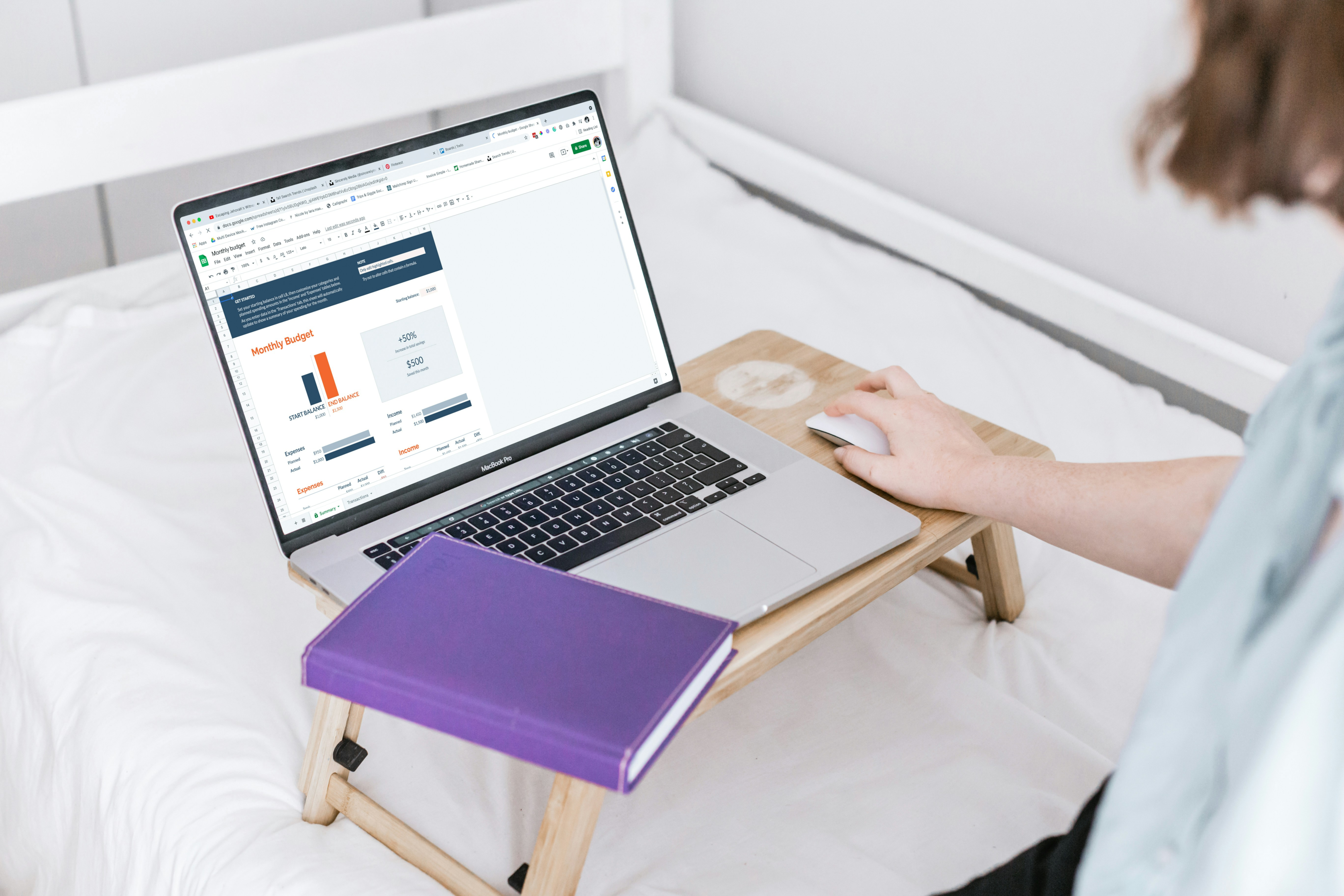Buying your first home is an exciting milestone, but it can also be overwhelming. From navigating through the intricacies of mortgage loans to understanding the role of your real estate agent, there's a lot to consider. Fear not! In this blog we will walk you through all these important tips for first-time home buyers, helping you confidently leap into homeownership.
Understand Your Finances

It's essential to conduct a comprehensive review of your financial situation before purchasing your first home. A glance at your credit report and score won't be enough; you need to dive deep into your overall financial health. Start by examining all your sources of income and assessing their stability. Don't just consider your current salary but also any additional sources of income, such as investments. Assessing the reliability and consistency of your income stream is crucial to determining your ability to handle mortgage payments over the long term.
Next, scrutinize your expenses. Create a detailed budget outlining all your monthly expenditures, including housing costs, utilities, transportation, groceries, debt payments, and discretionary spending. This thorough analysis will provide clarity on your spending habits and identify areas where you can potentially cut back to free up funds for homeownership expenses. At the same time, evaluate your existing debts, including credit card balances, student loans, car loans, and any other outstanding obligations. Calculate your debt-to-income ratio, which compares your monthly debt payments to your gross monthly income. Lenders often use this metric to assess your ability to manage additional debt, such as a mortgage.
Moreover, take into account your future earning potential and any anticipated changes in your financial situation. Are you expecting a salary increase or bonus in the near future? Do you anticipate any significant expenses or reductions in income, such as starting a family or changing careers? These considerations will help you gauge your financial stability and ability to afford homeownership in the long run.
Determine Your Budget

Creating a budget is an important step toward finding a home that fits your financial situation. To start, you can use online tools like mortgage calculators to estimate how much you might need to pay each month for a mortgage. But it's also important to think about other costs beyond just the mortgage payment. For example, there are property taxes, insurance, and utility bills to consider.
You'll also need to set aside some money for maintenance and repairs to keep your home in good condition. It's generally a good idea to make sure your mortgage payment is no more than 28-31% of your monthly income so you can still afford other important expenses. By carefully considering all of these factors, you can make informed decisions about what kind of home you can afford and plan for a financially stable future.
Save for a Down Payment

Saving for a down payment is often the biggest challenge for first-time buyers, but with strategic planning and discipline, it's achievable. Start by setting a specific savings goal and timeframe for reaching it. Consider automating your savings by setting up automatic transfers from your checking account to your down payment fund each month. Look for ways to boost your savings, such as cutting back on non-essential expenses, reducing debt, or increasing your income through side gigs or freelance work.
Consider alternative sources of funding for your down payment, such as gifts from family members, withdrawing from retirement accounts (like a Roth IRA), or tapping into equity from existing assets (like a 401(k) loan or home equity line of credit). Keep in mind that these options may have tax implications or impact your long-term financial goals, so consult with a financial advisor before making any decisions.
Be patient and stay focused on your savings goal. Remember that every dollar you save brings you one step closer to homeownership and the financial stability it offers. By prioritizing your savings and exploring all available resources, you'll be well on your way to achieving your dream of owning your first home.
Explore Down Payment Assistance Programs
Down payment assistance programs vary greatly depending on your location and specific eligibility criteria. Some of these programs offer grants or forgivable loans, providing funds that don't need to be repaid as long as certain conditions are met, such as residing in the home for a specified period. Others may offer low-interest loans or tax credits to help cover your down payment or closing costs. Eligibility requirements typically consider factors like income, credit score, homeownership status, and the property's location.
Income limits may be in place to target assistance to those with moderate to low incomes, while credit score requirements ensure applicants have a sufficient credit history to qualify for a mortgage. First-time homebuyers or those purchasing homes in revitalization areas may receive priority. Researching available programs in your area and understanding their criteria is essential. You can reach out to local housing agencies, nonprofit organizations, or lenders specializing in affordable housing programs for information. Work with a real estate agent or housing counselor to navigate the application process and identify the best options for your circumstances. By exploring these opportunities, you can significantly reduce the financial barriers to homeownership.
Get Pre-Approved for a Mortgage

Securing a pre-approval for a mortgage is a critical step towards buying a home. It provides a range of benefits and simplifies the process. When you apply for pre-approval, you'll need to gather and submit various financial documents such as pay stubs, tax returns, bank statements, and proof of assets. These documents offer the lender a comprehensive view of your financial situation, which helps them assess your creditworthiness. Based on your income, assets, debts, and credit history, they'll determine the maximum loan amount you qualify for.
A pre-approval letter carries significant weight in a competitive real estate market. It shows that you're a serious and qualified buyer, demonstrating your financial readiness and commitment to purchasing a home. As a result, it gives sellers confidence in your ability to secure financing and close the deal. In situations where there's more than one offer, having a pre-approval letter can give you an edge over other buyers who haven't taken this crucial step.
Getting pre-approved provides clarity and certainty during the home-buying process. It helps you narrow down your search to properties that align with your budget and financial capabilities. With a pre-approval letter, you can confidently make offers on homes knowing that you have the backing of a mortgage lender and can move forward with financing without delay.
When seeking pre-approval, it's essential to shop around and compare mortgage rates from multiple lenders to find the best terms and rates for your specific situation. Different lenders offer varying interest rates, loan programs, and closing costs. Therefore, it's advisable to explore your options and negotiate with lenders to secure the most favorable terms. By taking the time to research and compare mortgage offers, you can potentially save thousands of dollars over the life of your loan.
Work with a Real Estate Agent

A skilled real estate agent is an invaluable guide for first-time homebuyers, offering expertise and support throughout the home-buying journey. They navigate market complexities, analyze comparable sales data, and negotiate on your behalf to secure the best possible deal.
When selecting an agent, look for someone who specializes in working with first-time buyers, understands local market dynamics, and prioritizes building a strong rapport with their clients. By fostering a trusting relationship, you can navigate the process with confidence, knowing that you have a dedicated professional by your side.
To learn more about what makes a good real estate agent read visit https://huntingtonandellis.com/blog/what-makes-a-good-real-estate-agent
Conduct a Home Inspection
A home inspection is a crucial step when buying a house. It can help you avoid expensive repairs and unexpected problems in the future. So, what is a home inspection? It's when a professional inspector checks everything in the house, including the structure, plumbing, electrical systems, heating and cooling, insulation, and more. They'll also look for signs of water damage, mold, pests, and other potential issues. After the inspection, the inspector will give you a report with all their findings. You should read it carefully and pay attention to any problems they find.
If there are any significant issues, you may need to get the opinion of specialized professionals like engineers or technicians to assess the problem and estimate repair costs. Based on the inspection report, you may ask the seller to make repairs or offer you credits or concessions to deal with the problems. If the problems are too serious, you may even decide not to buy the house.
A home inspection is essential to protect your investment and make an informed decision about the property. It may cost you some extra money upfront, but it will give you peace of mind and save you money in the long run.
Factor in Additional Costs

When purchasing your first home, it's essential to consider the various costs beyond the initial purchase price and down payment. Closing costs, typically ranging from 2% to 5% of the purchase price, encompassing fees for appraisal, title insurance, attorney services, and other expenses necessary to finalize the transaction. Homeowners also need to budget for ongoing expenses such as homeowners insurance, which protects against property damage or loss, and property taxes imposed by local governments based on the property's assessed value.
If the property falls under a homeowners association (HOA), monthly or annual fees may apply for shared amenities and maintenance of communal areas. Another factor homeowners should account for is ongoing maintenance and repairs to ensure the property remains in good condition. By factoring in these additional costs, individuals can better prepare financially for the responsibilities of homeownership and avoid unexpected financial burdens during the purchasing process.
Stay Flexible
Flexibility is key when navigating the home-buying process, especially in a competitive market. Be prepared to adjust your expectations and priorities based on market conditions, available inventory, and your budget. Keep an open mind when viewing properties and consider factors like location, size, condition, and potential for future appreciation. Remember that finding the perfect home may take time, so stay patient and trust the process.
Enjoy the Journey
Buying your first home is an exciting and rewarding experience, so be sure to follow these tips for first-time homebuyers while also enjoying the journey along the way. Celebrate each milestone, from getting pre-approved for a mortgage to finding the perfect home and closing the deal. Take the time to envision yourself living in your new home and creating lasting memories with loved ones. With careful planning, patience, and the right support, you'll soon be settling into your dream home and embarking on the next chapter of your life.




